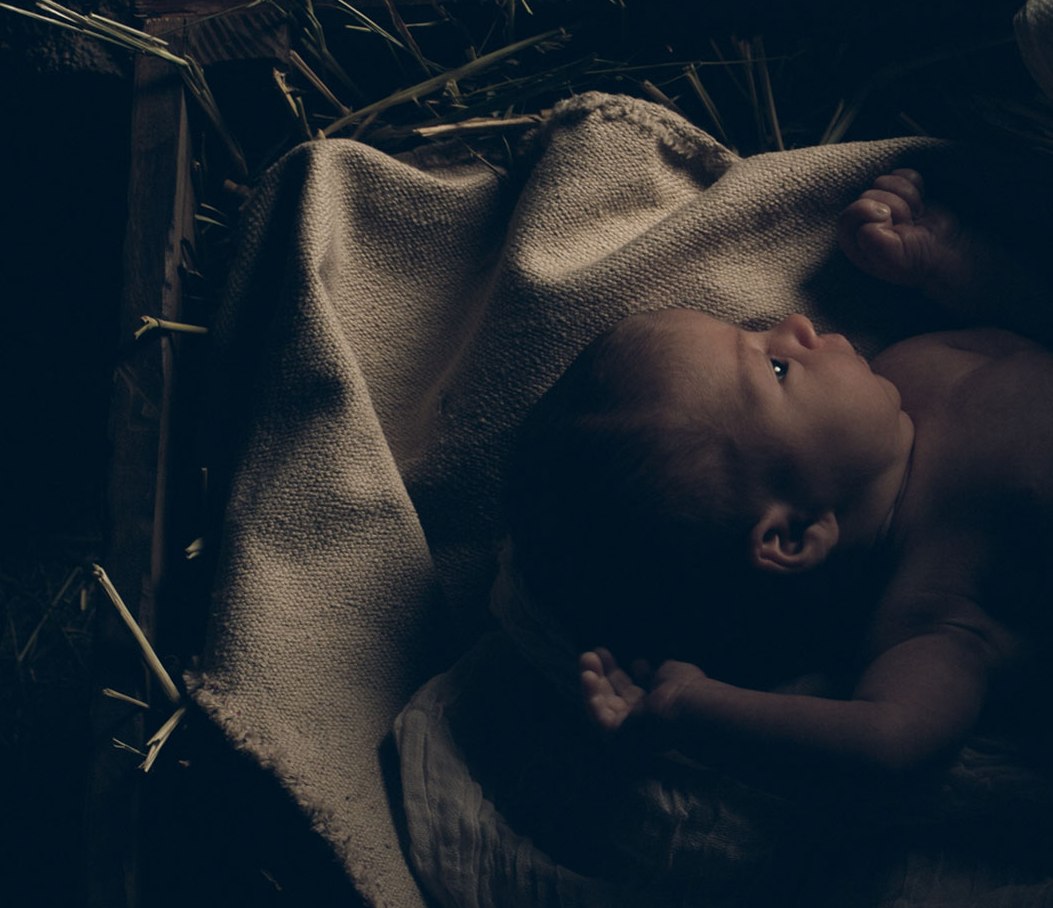|
This is an important question, because our salvation depends on it. Christ’s work of salvation requires his two-fold nature: God and man in one perfect, glorious Person. The incarnation makes salvation possible. But how? To answer this question we need to look at the offices of Christ. According to Scripture Jesus fulfils three offices: Prophet, Priest and King. Let’s look at each of these briefly.
Prophet As our Prophet Jesus reveals God and his will to us. Long ago, according to Hebrews 1:1-4, God spoke to us by the prophets, but now God has spoken to us by his Son. Jesus is the supreme prophet that God promised in Deut. 18:15-18: “The LORD your God will raise up for you a prophet like me from among you, from your brothers - it is to him you shall listen.” What makes Jesus the supreme prophet isn’t simply his message, but his person. Unlike the other prophets who spoke for God, Jesus is God. This means that in his preaching and in his person, he reveals God to us. King In Isaiah 9:6 God promised us a ruler. The promise makes it clear that he would establish a conquering, peaceful, eternal, messianic, righteous reign. In order to be that promised king, Jesus had to be born in the line of David. In 2 Samuel 7:16 God promised: “And your house and your kingdom shall be made sure forever before me. Your throne shall be established forever.” Jesus is that promised ruler. He has been given “as head over all things to the church” (Eph. 1:22). Unlike the kings who came before him, Jesus has the power and the character to establish this glorious kingdom, because he is God. Priest Hebrews 4:14-5:10 details how a priest was chosen from among the people so that he could be a sympathetic mediator. Jesus became a man so that he could bring the sacrifice and intercede for us before the Father’s throne. While it is true that Jesus wasn’t born in the tribe of Levi or to the house of Aaron, he was ordained as a priest after the order of Melchizedek (Psalm 110:4). This means that his priesthood is superior to Aaron’s. Jesus is a sinless High Priest and offered one all-sufficient sacrifice, because he is both God and man. Why did Jesus have to become a man? Because our salvation would not have been possible without it. Because of Christ, Pastor Pieter Life is hard. That may not sound very encouraging, but it is true. It is universally true. Jesus and his disciples weren’t spared the difficulties of life. Christ’s perfection did not shield him from trials. The disciples’ proximity to Jesus didn’t protect them from persecution. Did they despair? No, quite the opposite: they rejoiced!
How? We know that Jesus, for the joy set before him, endured the cross (Heb. 12:2). The disciples had a similar perspective. In 1 Peter 1:6 the apostle Peter writes of believers who “rejoice, though now for a little while, if necessary, you have been grieved by various trials”. Where does this joy come from? Part of it is found in their identity. In verse 1 Peter calls them “elect exiles”. God’s Old Testament people, Israel, were also called exiles or sojourners. This shaped their identity: they weren’t like the other nations around them; they weren’t at home among them; they were heading for a better home. Similarly, the church is God’s chosen people and that means that we shouldn’t be at home here. We are waiting for another home. Joy is also found in their inheritance. Verse 3-5 details the promise of the gospel. They have been “born again to a living hope” and to “an inheritance”. Regeneration, also called being born again, makes us new. It changes us from the inside out: a new heart, renewed mind and the indwelling Holy Spirit are all part of this wonderful act of grace. With this new nature we are then also given an inheritance. Peter describes it as “imperishable, undefiled, and unfading, kept in heaven for you” (v. 4). Amazingly, not only does God guard the inheritance, but he guards his children as well: “who by God’s power are being guarded through faith” (v. 5). So when we read about their joy in verse 6 we understand that it was rooted in the gospel, not in their circumstances. We understand that believers can rejoice because of what God has done for us in Jesus Christ. Yes, life is hard, but God’s children confess: “Though we have not seen him, we love him. Though we do not now see him, we believe in him and rejoice with you that is inexpressible and filled with glory” (adapted from 1 Peter 1:8). Because of Christ, Pastor Pieter There are things that are simply too great for me. They are too great for me to comprehend or control. The plans and purposes of God are mysterious – I simply cannot wrap my head around them. Things happen in the providence of God – I cannot change them. I may wish to understand or strive to control, but ultimately I have to confess that I am just too small. Thankfully, I am not alone.
David had a similar struggle. There were many things that David did not understand and could not control. So what did David do? He relaxed, or more accurately: he rested in the Lord. Note what he says in Psalm 131: “O LORD, my heart is not lifted up; my eyes are not raised too high; I do not occupy myself with things too great and too marvelous for me. But I have calmed and quieted my soul, like a weaned child with its mother; like a weaned child is my soul within me. O Israel, hope in the LORD from this time forth and forevermore.” The Psalm starts with David humbling himself before the Lord. Lifting up your heart or raising your eyes signified pride (v. 1). Instead of overestimating his own abilities, David did “not occupy myself with things to great and too marvelous for me.” This does not mean that David did not wrestle with the Lord or that he was indifferent. David thought great thoughts about God and he did great things for God. But David knew his limits. He understood that some things were just beyond him: beyond his understanding and abilities. In those moments David did not become restless, anxious or frustrated. He “calmed and quieted” his soul (v. 2). How do we do that? He tells us in the final verse: “hope in the LORD” (v. 3). In those moments he rested in God, “like a weaned child with its mother” (v. 2). You don’t understand it all, but God does. You can’t do it all, but God can. What will you do when you are faced with “things too great for me”? Take David’s advice: “hope in the Lord”. Because of Christ, Pastor Pieter A lot has been written about the effects of technology and social media on society. Our phones and apps have a tendency to distract us, to take us out of the moment so that we live our lives through a lens instead of being present. But this is not the only temptation that our modern obsession with social relevance brings. There is another danger. It is an ancient vice that has become a modern virtue: narcissism.
Legend has it that Narcissus was so beautiful that he fell in love with his own reflection. His self-obsession eventually cost him his life. That is what narcissism is: it is the worship of self. What does this have to do with social media? So much of our social media obsession is rooted in our desire to look good and to be admired. That is why we only post pictures of our “best sides”. We publish our achievements and ignore our failures. And when we don’t get the adoration we think we deserve, we become depressed. “Why didn’t anyone ‘like’ my photo? Why didn’t they comment?” The same applies when we pity ourselves on social media. It is another way of seeking attention – it is an expression, not of humility, but of wounded pride. So what is the answer? Some suggest abandoning social media. It might help, but it won’t deal with the core issue. Self worship doesn’t need an internet connection. No, we need to abandon self. Jesus said: “If anyone would come after me, let him deny himself and take up his cross and follow me.” (Mark 8:34). This is the only way to eliminate self worship: true worship. Social media is a symptom, not the problem: our idolatrous hearts are the real issue. The only way to push self out is by inviting Jesus in. You’ll only do that if you believe that Jesus is worth it – that Jesus is better than self. What do we want most: to look good or to look like Jesus? To be admired or to admire Jesus? Let’s look away from our reflections and “[look] to Jesus, the founder and perfecter of our faith” (Hebrews 12:2). Because of Christ, Pastor Pieter Why do we sleep? Our modern obsession with productivity views sleep as a hindrance or a burden. Sleep is usually one of the first things that we sacrifice to maintain the pace of our busy lives. We quote passages like Proverbs 6:10-11: “A little sleep, a little slumber… and poverty will come upon you like a robber”. We convince ourselves that we are following the example of our Lord when we rise “very early in the morning” (Mark 1:35) or work well after “sundown” (Mark 1:32). Didn’t the apostle Paul “not cease night or day to admonish everyone” (Acts 20:31)?
While the Bible condemns laziness and sloth, it also warns us against neglecting rest. At creation God “blessed the seventh day and made it holy, because on it God rested” (Gen. 2:3). Rest was part of God’s design for the world, even before the Fall. Jesus confirms that God did this for our sake: “The Sabbath was made for man” (Mark 2:27). The cycle of day and night was part of God’s design; the God-ordained rhythm for our lives. Jesus, as the incarnate Son of God, understood this. Jesus slept (Mark 4:38). Jesus also encouraged his disciples to rest after a season of intense ministry (Mark 6:31). God created us in such a way that we need sleep. However, it would be wrong to view sleep simply as a necessity. It is also a gift: “It is in vain that you rise up early and go late to rest, eating the bread of anxious toil; for he gives to his beloved sleep.” (Ps. 127:2). Only God does not sleep: “he who keeps Israel will neither slumber nor sleep.” (Ps. 121:4). Sleep reminds us that God is God and that we are not. God does his work, keeps his children, and sustains the world all while we are sound asleep. Sleep is a reminder that we need God. Understood this way, sleep becomes an act of worship and faith. Why don’t you sleep? Maybe we sleep less than we need to, because we don’t trust God as much as we should. Because of Christ, Pastor Pieter “What is man?” (Psalm 8:4). We’ve attempted to answer this question biblically: God created man for his glory, in his image, as both male and female; a unity of body and soul. Tragically, this picture of humanity was distorted by the fall. We became less than we were originally intended to be: we became sinners.
But the story does not end there. God promised a “seed” who would restore what sin had destroyed (Genesis 3:15). Throughout human history God entered into covenant with certain people so that through them He could send the promised Seed. That is why God promised Abraham: “in you all the families of the earth shall be blessed” (Genesis 12:3). That was God’s purpose when He promised David: “your house and your kingdom shall be made sure forever before me. Your throne shall be established forever” (2 Samuel 7:16). God also sent prophets to prepare the people for the coming of this Seed. God gave Isaiah a prophecy: “Therefore the Lord himself will give you a sign. Behold, the virgin shall conceive and bear a son, and shall call his name Immanuel.” (Isaiah 7:14). God gave Daniel a vision: “with the clouds of heaven there came one like a son of man, and he came to the Ancient of Days and was presented before him. And to him was given dominion and glory and a kingdom, that all peoples, nations, and languages should serve him” (Daniel 7:13-14). These and other prophets prepared God’s people for this Redeemer’s coming. And then He came: “the Word became flesh and dwelt among us, and we have seen his glory, glory as of the only Son from the Father” (John 1:14). In Jesus we see what humanity was meant to be: “At present, we do not yet see everything in subjection to him [that is humanity]. But we see him who for a little while was made lower than the angels, namely Jesus, crowned with glory and honour” (Hebrews 2:8-9). Jesus Christ became the perfect man, lived the perfect life and died the death we deserved to die. Sinners are redeemed – humanity is restored – in Christ. The New Testament explains this “recreation” like this: “if anyone is in Christ, he is a new creation. The old has passed away; behold, the new has come.” (2 Corinthians 5:17). What sin has destroyed, Christ has restored. We can only fulfil our true purpose when we are united, by faith, to this perfect Man. Because of Christ, Pastor Pieter In Psalm 8:4 David asks God an interesting question: “what is man that you are mindful of him, and the son of man that you care for him?” We’ve attempted to answer that question by reviewing what the Bible teaches about man. What is it about man that makes us the objects of God’s special attention?
We’ve noted that God created man for his glory, in his image, as both male and female. We’ve also seen that man is a unity of body and soul, of the physical and the spiritual. Given the remarkable and unique nature of man, we can understand why David would later write: “I praise you, for I am fearfully and wonderfully made.” (Ps. 139:14). Sadly, this perfect picture was marred. The story of humanity does not play out in the Garden of Eden, in unbroken fellowship with our Creator. Scripture reveals that humanity chose something else. Eccl. 7:29 explains it this way: “See, this alone I found, that God made man upright, but they have sought out many schemes.” According to Genesis 3 Adam and Eve rebelled against God. They believed the devil’s lie: “With my help you can become your own gods and do better for yourselves than what God had done for you.” Foolishly, they chose to obey the creature and not their Creator. The consequences were devastating. Physical and spiritual death entered the world (Romans 5:12). Suddenly our fellowship with God was severed and shame, guilt and fear took its place (Genesis 3:10). Because of our separation from God, toil and pain now characterized our human experience (Genesis 3:16-19). Sin not only affected us individually, but corporately as well: our relationships with one another suffered (Galatians 5:19-21). In short, sin redefined humanity: we became sinners. But, before we despair, remember that Psalm 8 was written after the Fall. The image of God in man was marred and distorted, but not entirely destroyed (Genesis 9:6). God still loved humanity, in spite of our rebellion. “God so loved the world, that he gave his only Son, that whoever believes in him should not perish but have eternal life.” (John 3:16). God did not abandon his creatures, but became one of them so that they could be saved. Because of Christ, Pastor Pieter Genesis 2:7 tells us that “the LORD God formed the man of dust from the ground and breathed into his nostrils the breath of life, and the man became a living creature.” This passage raises an interesting question: what is man made of?
There are three basic view of the nature of man. Some believe that man is a body, soul and spirit (trichotomy). Others believe that man has two parts: our visible bodies and invisible souls (dichotomy). Then there are those who believe that man is nothing more than a body (monism). The last view (monism) is clearly non-Christian, but which of the other two should Christians accept? Before we continue, we need an important reminder: Scripture emphasises the unity of man. The whole man was created by God to exist in a unity. Our salvation touches the whole man and will only be complete with the restoration of our whole being (1 Cor. 7:34; 2 Cor. 7:1). That being said... There are a number of Scriptures that use soul and spirit interchangeably (John 12:27; 13:21; Luke 1:46-47). The dead are either called spirits (Heb. 12:23) or souls (Rev. 6:9) and at death either the soul or the spirit departs (Luke 12:20; Ps. 31:5). There are also occasions where man is described as a body and soul (Matt. 10:28) or a body and spirit (1 Cor. 5:5; Jam. 2:26). Arguments for trichotomy focus on 1 Thess. 5:23 and Heb. 4:12. In 1 Thess. 5:23 Paul is simply piling on synonyms for emphasis (much like Jesus does in Mark 12:30). The same holds true for Heb. 4:12. The weight of evidence is with dichotomy: man as unity of body and soul. Why is this important? Because we need to guard against two common errors associated with trichotomy. The first is to assume that only spiritual things matter. Don’t be so heavenly minded that you are of no earthly good. The second is to assume that the mind is an enemy. Anti-intellectualism robs our faith of its substance. Be a complete Christian, who understands that our visible bodies and our invisible inner man (spirit and soul) have to be submitted to serving Christ. Because of Christ, Pastor Pieter “When I look at your heavens, the work of your fingers, the moon and the stars, which you have set in place, what is man that you are mindful of him, and the son of man that you care for him?” (Ps. 8:3-4). What is it about humanity that makes us the object of God’s special attention? So far we’ve seen that God created man for his glory and in his image. These two realities should be the starting point of all our thinking about what it means to be human. But the creation story doesn’t end there... According to Genesis 1:27, God not only made man in his image, but he also made us “male and female”. The two sexes were a part of God’s design, not the product of culture. God wanted humanity to be comprised of two complementary but different sexes. This has a number of implications. First, God made us male and female so that we can have harmonious interpersonal relationships. When Adam first met his wife Eve, God instructed him that they will form a unique and exclusive bond, becoming one in marriage (Gen. 2:24). This is the most intimate relationship we can have. It reflects the unity of the Trinity and becomes the basic building block for human society. Marriage is not cultural – it is creational. There are occasions when people do not marry (Jesus and the apostle Paul were not married), but God’s norm for humanity is unity in marriage. Second, it means that men and women have equal worth, personhood and importance. God’s image is not something that was bestowed exclusively or especially on men. 1 Peter 3:7 instructs men to show honour to their wives, because they are fellow heirs of the grace of life. In 1 Cor. 11:11-12 Paul makes it clear that men and women need one another. Gal. 3:28 states emphatically: “There is neither Jew nor Greek, there is neither slave nor free, there is neither male nor female, for you are all one in Christ Jesus.” Exalting one sex over the other would be a betrayal of God’s design. Third, God has a unique role for each of the sexes. According to 1 Cor. 11:3 the husband is the head of the wife, as Christ is head of every man. Paul later explains that, when God made Adam first (Gen. 2:7), it was indicative of his leadership role. Eve was made as a helper for Adam (Gen. 2:18). This does not indicate levels of importance, but it does indicate different roles. Men are called to provide, protect and lead. Women are called to help, nurture and support. This is not a cultural norm, but a biblical one. Why are these things important? Society has abandoned God’s original design. We find men oppressing and abusing women, women vilifying men and young people abandoning marriage. Some are even abandoning their born sex, claiming that they can define who or what they want to be. The tragic result? Divorce, depression, confusion and in some cases even suicide. Happiness is not found in abandoning God’s plan, but in embracing it. Because of Christ, Pastor Pieter “When I look at your heavens, the work of your fingers, the moon and the stars, which you have set in place, what is man that you are mindful of him, and the son of man that you care for him?” (Ps. 8:3-4).
Our understanding of humanity will have a big impact on how we answer this question. Why does humanity matter? More importantly, why does humanity matter to God? As we’ve pointed out before, we are God’s handiwork, made for his glory. This explains the reason behind why we were made and it reveals the purpose for which we were made. It doesn’t, however, explain how we were made. What makes us unique? How did God fit us to be instruments for his glory? Genesis 1:26 gives us the answer: “Then God said, ‘Let us make man in our image, after our likeness.’” Man was uniquely created in God’s image – no other creature in God’s creation was made in His image. But what does it mean to be made in God’s image? Believers have pondered this question for centuries, and while they may differ on some of the details, they’ve generally come to identify three key aspects of God’s image in man. First, it means that we represent God. In the ancient Near East the king was considered the visible representation of the nation’s deity. Therefore the king ruled on behalf of God. In v. 26 we see that man is given dominion over creation, which points to man representing God in ruling creation. Our place in the food chain is determined by our relation to God as his image bearers. Second, it means that we can have a relationship with God. In v. 27 the pattern of male and female is said to be part of the image. This implies that man, in the image of God, was made to be relational. We were created with the capacity to have meaningful relationships with one another and ultimately with God. By God’s design no man is an island. Third, it means that we bear a resemblance to God. We do not bear a physical resemblance to God, because God is Spirit. However, we were made with characteristics that we share with God and not with other creatures: reason, morality, language, creativity and the like. When God created man He communicated or imparted some of his own attributes to us (though to a lesser degree): holiness, righteousness, love, kindness... There are other attributes that God did not communicate to us, like immutability (unchangeableness), but those attributes that God did communicate to us enable us to resemble or reflect God in the world. Because we bear this resemblance to God (reflecting his attributes) we can have meaningful relationships with God and others, as well as rule over creation as God’s representatives. Clearly we are more than just highly evolved animals: God made us as his image-bearers. Tragically this image was marred and distorted by the fall (Genesis 3), but when we think about what it means to be human, we should not forget God’s original design: image-bearer. Because of Christ, Pastor Pieter “When I look at your heavens, the work of your fingers, the moon and the stars, which you have set in place, what is man that you are mindful of him, and the son of man that you care for him?” (Ps. 8:3-4). While David looked up at the stars, contemplating the majesty of God’s cosmic creation, he paused to reflect on his own place within it. It gave him perspective: a glimpse into how frighteningly small human beings are. Given our almost imperceptible size on the grand stage of the universe, why would God care about man? Why did God make us? God did not make man out of some sense of need. God is absolutely independent and does not need our prayers, efforts or offerings. Acts 17:24-25 states: “The God who made the world and everything in it, being Lord of heaven and earth, does not live in temples made by man, nor is he served by human hands, as though he needed anything, since he himself gives to all mankind life and breath and everything.” Why, then, were we made? In Isaiah 43:7 God explains that He made us “for my glory”. God has made us and God saves us so that we “might be to the praise of his glory” (Eph. 1:12). As the Westminster Shorter Catechism states: “What is the chief end of man? Man's chief end is to glorify God, and to enjoy him forever.” This answer also reveals that our glorification of God is not a one-sided affair: we get to enjoy God as we glorify him! Jesus said: “I came that they may have life and have it abundantly.” (John 10:10). That abundant life is found in knowing God, with whom there is “fullness of joy” and “pleasures forevermore” (Ps. 16:11). So what is man? We are God’s handiwork, made for his glory. If that is the purpose for which we were made, how ought we to live? If that is what it humanity was made for, how human are you? Because of Christ, Pastor Pieter |
Topics
All
By Date
April 2024
|











